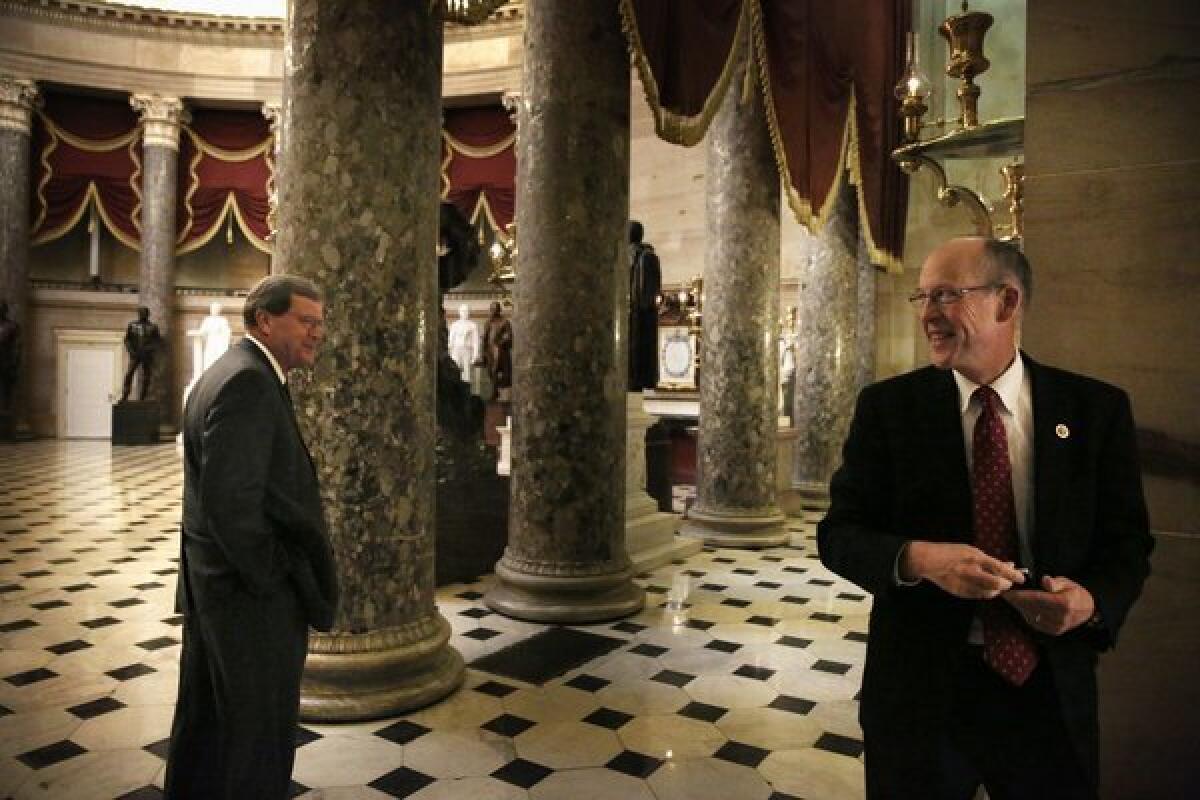New talks underway to end government shutdown, lift debt ceiling

WASHINGTON -- The impasse over government spending gave way Friday to a steady stream of negotiations, as Republicans in the House and Senate and White House officials sought to nail down details of an agreement that would both reopen shuttered government agencies and avoid a federal default.
In phone calls and a face-to-face meeting at the White House, President Obama and Republican lawmakers hashed out a plan that would temporarily restore government funding and lift the debt ceiling, while initiating a new round of budget and deficit reductions talks.
But the task of sealing the deal was complicated by divisions between Senate and House Republicans, who were conducting separate negotiations and had not united behind an offer.
Still, for the first time in the standoff, lawmakers expressed hope that a deal could be reached in the next few days.
“I just have a sense over the weekend some significant gelling is going to take place,” said Sen. Bob Corker (R-Tenn.). “Some time over the next week -- potentially as early as midweek -- I think something could well happen that addresses the debt ceiling and CR,” he said, using the legislative abbreviation for a continuing resolution to fund government programs.
Even qualified hopefulness was a striking shift after the days of deadlock in Washington. Large parts of the government remained closed. In many agencies, federal workers received partial paychecks Friday, reflecting the first week of furloughs. Meanwhile, the government inched closer to Oct. 17, when the Treasury Department has said the government will max out its ability to borrow enough to cover expenses.
Under pressure to avoid the risk of a default and watching the standoff take a toll on their public approval, Republicans on Thursday dropped their refusal to lift the debt limit without first drawing the president into budget negotiations, offering a six-week extension. Late Thursday, after more discussions with the White House, they added a plan that would also reopen the government – at least temporarily.
A House proposal would launch a two-track negotiation over at least the next six weeks, officials said. On one track, in return for temporarily lifting the nation’s debt ceiling, Republicans want a series of talks focused on tax changes as well as spending cuts to Medicare and other popular programs outlined by Rep. Paul D. Ryan (R-Wis.), the party’s budget guru.
On the second track, House Republicans would reopen government if the White House agreed to talks on the more immediate budget spending levels for the 2014 fiscal year, which began Oct 1. Both parties would like to postpone the next round of across-the-board cuts, the so-called sequester, due Jan. 1.
But House Republicans were still insisting on some concessions as a condition of reopening government, the substance of which was still being debated within GOP ranks late Friday but could include slight changes to the new healthcare law. Senate Republicans, meanwhile, had proposed their own endgame.
Congressional Democrats seemed content to sit back and allow the Republicans to argue among themselves, knowing that with the GOP increasingly anxious to end the standoff, their leverage increases as the Oct. 17 deadline draws closer.
More to Read
Sign up for Essential California
The most important California stories and recommendations in your inbox every morning.
You may occasionally receive promotional content from the Los Angeles Times.











